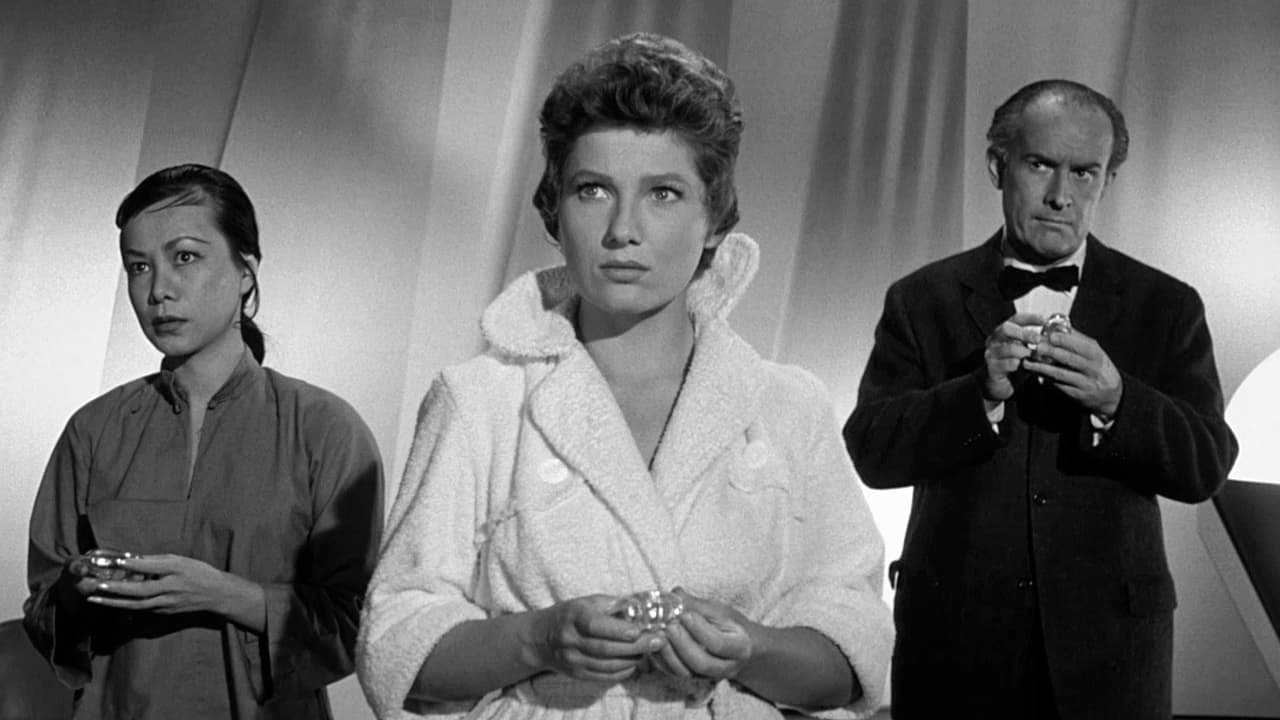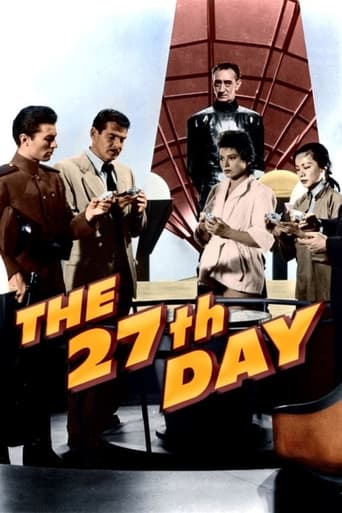

Five seemingly random individuals find themselves mysteriously on board an alien craft. The alien gives each person three capsules. Each capsule is capable of wiping out vast sections of the Earth's population, but will not harm anything else. The five are sent back to their homes with their powerful weapons and told that they have 27 days in which to either use their devices to destroy humanity or find a way to live in peace. If they should chose to wipe-out the Earth's population, the aliens will take over the world. If not, the aliens will move on and look for another home. Each of the five is left with a horrible dilemma – how to handle this kind of power?I was going to get into detail on a whole political thing about some of the deeper aspects of The 27th Day, but I've since thought better of it. I usually write about the entertainment value of a film and what I liked and didn't like. I tend to leave the deep thinking for people who are much smarter than me. All I say on the subject is I would hate to see anyone allotted this kind of power given the current state of affairs in the world where words are considered a form of violence. I'd hate to see what someone would do with these capsules just because they felt slighted, etc. The ending of the films is especially troubling. So the people in the film discover how to use their devices to kill only those they consider evil because they do not support freedom? How do you decide who is in favor of freedom and what is your definition of evil? Were all those communists you wiped out really evil? Or were some of them living under a regime they did not agree with? Just a silly, illogical, nonsensical way to end the film. On to other things. So, was The 27th Day an entertaining film? Reading through some of the comments on IMDb, I know it has its fans, but I'm not really one of them. The film is well made, it has a reasonably interesting premise, and it features rock solid acting. But, unfortunately, it is all pretty much a bore. I found most of the movie as dry as dust. I had to fight with myself to stay awake. The relatively short 75 minute runtime just seemed to drag on and on forever. People talking and talking and talking with nothing much happening. Not what I call entertainment. And then there's that ending I've already discussed. What a mess. My one sentence summary: The 27th Day is a well-made film that suffers from a deathly dull script and an ending I find especially troubling. An unfortunate 4/10 from me.
... View MoreFive disparate individuals from across Earth are contacted by an alien intelligence (Arnold Moss). They are American newspaperman Jonathan Clark (Gene Barry), English woman Eve Wingate (Valerie French), German scientist Professor Klaus Bechner (George Voskovec), Chinese woman Su Tan (Marie Tsien), and Russian soldier Ivan Godofsky (Azemat Janti). Each is given a "box" containing capsules with tremendous power - the power of life and death. If all five people can refrain from exploiting the destructive power of the capsules, Earths' people will be spared by the aliens, who are looking for a new planet to colonize.Scripted by John Mantley from his novel, and directed without frills by William Asher, "The 27th Day" is marked by an intelligent and interesting premise. It won't be to every taste because instead of dazzling us with action scenes or special effects, it instead focuses on examining the human tendencies towards xenophobia, paranoia, self destruction, and conflict. Naturally, people in power do end up discovering the amazing "gifts" bestowed upon the five strangers, and learn of their potential. Events escalate towards a tense showdown with the Russians, who see the annihilation of the Western world within their reach.Jonathan and Eve, all too aware of what reactions will be once the world at large learns their identities, attempt to hide out (and predictably, fall in love, although this subplot remains appreciably minor). The most important breakthroughs are made by Professor Bechner, who means to study the capsules in greater detail.The performances are solid from the well chosen cast. Likable leads Barry and French are extremely well supported by actors such as Stefan Schnabel as the warmongering Russian general, Friedrich von Ledebur as the sincere Dr. Neuhaus, and Paul Birch as an American admiral. Paul Frees and Mel Welles appear unbilled; the greatest contribution is by Mr. Voskovec, one of those actors who makes exposition worth listening to.This definitely merits a look from fans of '50s science fiction.Eight out of 10.
... View MoreFive ordinary earthlings are given a box by a benign alien (a fine and credible performance by Arnold Moss) containing capsules capable of killing millions of people. If they can refrain from using the capsules with twenty-seven days, then the earth will be spared from annihilation.Director William Asher relates the intriguing story at a steady pace and maintains a serious thoughtful tone throughout. John Mantley's compelling script offers an intelligent and provocative exploration of human nature as well as mankind's capacity for either self-destruction or self-preservation. Gene Barry as cynical reporter Jonathan Clark and Valerie French as the sweet Eve Wingate make for appealing leads; they receive sturdy support from George Voskovec as the kindly Professor Klaus Bechner, Stefan Schnabel as a sadistic power mad Russian general, Friedrich von Ledebur as the wise and noble Professor Karl Neuhaus, Paul Birch as a hard-nosed admiral, and Azemat Janti as resolute Russian soldier Ivan Godofsky. The ubiquitous Paul Frees has a small uncredited role as a newscaster. Henry Freulich's crisp black and white cinematography provides a nice sharp look. A solid little movie.
... View MoreI guess I owe the Turner Classic Movie channel a big thank you for it's New Year's Day hangover relief recipe, a full day of sci-fi programming that offered some great well known classics, along with (for this viewer) previously unheard of gems like this one - "The 27th Day". It's premise immediately called to mind the plot for the the best film of it's kind in the genre, "The Day The Earth Stood Still". However, instead of offering the citizens of Earth an ultimatum as in the latter picture, 'The 27th Day" gives five ordinary Earthlings from the world powers a device that has the potential to eradicate all of mankind. Right off the bat, one begins to wonder what in fact you might do yourself if given such a responsibility.One can't miss the era's anti-Communist propaganda theme in the course of the story, though the message seems a bit deeper than one might originally think. During the 1950's, China was emerging as a world power, but was still largely ineffective in pushing it's huge weight around; interestingly, the Chinese girl Su Tan opted to commit suicide rather than face the decision to deal with her device. Whereas the Russian private Ivan Godofsky reflected a willingness to die rather than reveal the secret of the doomsday device to his military superiors. It reinforced for me the idea that the vast majority of humanity would have no problem living peaceably together, except for their leaders who believe in the superiority of their nation or race. The movie points out how easy it is for reason, discipline and restraint to give way to fear, as people find it easy to fear most everything, not the least of which would be an alien threat of the outer space kind.The only thing I found to be rather troubling with the story was it's resolution in the way it played out German Bechner's (George Voskovec) mathematical interpretation of the alien capsules. The Soviet General is shown defeated and dying as a 'confirmed enemy of freedom', but just how the alien gizmo could fine tune it's radar to locate individuals like that was way beyond the movie's ability to explain adequately. I also got a kick out of Professor Bechner's entreaty to the aliens at the end of the story from a seat at the United Nations; giving them fifteen seconds to respond from somewhere out in the far reaches of outer space. Geez, couldn't he have allowed for atmospheric disturbances or some other technicality? Why not a full sixty seconds!!About the only recognizable name actor in the flick is "War of the Worlds" alumnus, Gene Barry. Remember that scene in the tavern with the English woman Eve Wingate (Valerie French)? There was a TV playing over the bar with a Western shootout on view; I'd like to think it was an episode of 'Bat Masterson', but that series came out the following year. In a different scene, Barry's character Jonathan Clark got in a line to Eve about American rock n' roll, calling it 'music almost'.Anyway, for a chance viewing on an otherwise dreary, rainy New Year's Day, the film wound up an unexpectedly good and interesting treat, even if dated against the backdrop of current world events. Catch it if you can.
... View More